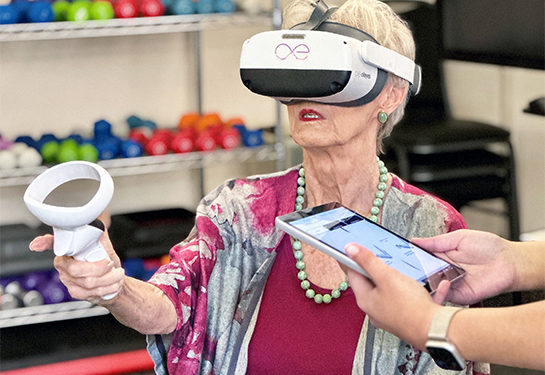Pituitary Tumor Surgery
UC Davis Health combines expertise with compassionate care for people who need pituitary surgery.
Medically reviewed by Kiarash Shahlaie, M.D. on July 14, 2025.

Advanced Approaches to Pituitary Surgery
Up to 10% of the population has a tumor or cyst of the pituitary gland, the bean-sized gland at the base of the brain. A pituitary tumor sometimes affects hormones that control important body functions. A tumor can also put pressure on areas of the brain that affect vision. When this happens, surgery may be necessary.
Having surgery to remove a pituitary tumor can be daunting. Our experts are here to help you every step of the way. Our Pituitary Disorders Program brings together an interdisciplinary team to diagnose and treat pituitary tumors. Our team includes specialists from neurology, neuro-oncology, neuropathology, neurosurgery, otolaryngology, and radiation oncology to diagnose and treat pituitary tumors.
Pituitary Tumor Treatment
At UC Davis Health, you receive targeted treatment using the latest surgical techniques. We use intraoperative neuronavigation, which is like a roadmap for the brain, to guide surgery.
The type of surgery we recommend for you depends on the location, size, and type of tumor you have. We perform minimally invasive surgery, including "keyhole" craniotomies, when possible. Minimally invasive surgery uses smaller incisions and your body’s natural pathways.
The main types of pituitary surgery are:
Endoscopic Endonasal Approach (EEA)
The endoscopic endonasal approach (EEA) is used for almost all pituitary tumor surgeries. The surgical team passes an endoscope (a thin tube with a miniature camera) through the nasal cavity, without any external incision, to access the pituitary mass from below. This minimizes the risk of neurological injury, and there are no scars.
Medical Treatment
Some pituitary tumors do not require surgery and can instead be treated with medicines. Our multidisciplinary clinic includes surgeons and endocrinologists with expertise in every treatment option for pituitary tumors and cysts.
Request an Appointment
As Sacramento's No. 1 hospital, you'll benefit from unique advantages in primary care and specialty care. This includes prevention, diagnosis and treatment options from experts in 150 specialties.
Referring Physicians
To refer a patient, submit an electronic referral form or call.
800-4-UCDAVIS
Patients
Call to make an appointment.
Consumer Resource Center
800-2-UCDAVIS
It’s important to understand what to expect with brain surgery. Your provider will discuss the surgical procedure with you. A care coordinator will guide you through pre- and post-operative appointments and testing.
-

-

During Surgery
Pituitary tumor surgery is performed by a team of ear, nose, and throat (ENT) surgeons who access the tumor from below, and a neurosurgeon who removes the tumor. The operation is performed under general anesthesia and uses the latest minimally invasive tools, including surgical navigation.
-

After Surgery
Learn more about your care at homearrow_forwardYour recovery is important to us. Most patients stay in the hospital 1-2 days after pituitary tumor surgery. We’ll review prescription medications with you when you are discharged. We’ll also schedule follow-up appointments and help you ease back into home life.
“Pituitary Tumors,” American Brain Tumor Association, https://www.abta.org/tumor_types/pituitary-tumors/
Follow-Up Care for Pituitary Surgery
When you go home, it’s essential for you to follow the guidelines from your provider. Follow-up care often includes check-ups and testing. You may have prescription medication to take. In some cases, you may be referred to physicians in related specialties.
Blood Tests and Imaging
Your provider may order blood tests to check your hormone levels. Hormone levels indicate if your pituitary gland is working properly. MRI scans are also common after surgery.
Medication
Some people may need hormone therapy to stabilize their pituitary hormone levels.
Visits With Specialists
Your provider may recommend visits with other specialists to assess your neurological functions. These will include endocrinology, ENT, and, sometimes, neuro-ophthalmology specialists.

Ranked among the nation’s best hospitals
A U.S. News & World Report best hospital in cardiology, heart & vascular surgery, diabetes & endocrinology, ENT, geriatrics, neurology & neurosurgery, and pulmonology & lung surgery.

Ranked among the nation’s best children’s hospitals
U.S. News & World Report ranked UC Davis Children’s Hospital among the best in pediatric nephrology, orthopedics*, and pulmonology & lung surgery. (*Together with Shriners Children’s Northern California)

Ranked Sacramento’s #1 hospital
Ranked Sacramento’s #1 hospital by U.S. News, and high-performing in aortic valve surgery, back surgery (spinal fusion), COPD, colon cancer surgery, diabetes, gynecological cancer surgery, heart arrhythmia, heart failure, kidney failure, leukemia, lymphoma & myeloma, lung cancer surgery, pacemaker implantation, pneumonia, prostate cancer surgery, stroke, TAVR, cancer, orthopedics, gastroenterology & GI surgery, and urology.

The nation’s highest nursing honor
UC Davis Medical Center has received Magnet® recognition, the nation’s highest honor for nursing excellence.

World-class cancer care
One of ~59 U.S. cancer centers designated “comprehensive” by the National Cancer Institute.

A leader in health care equality
For the 13th consecutive year, UC Davis Medical Center has been recognized as an LGBTQ+ Healthcare Equality Leader by the educational arm of America’s largest civil rights organization.

